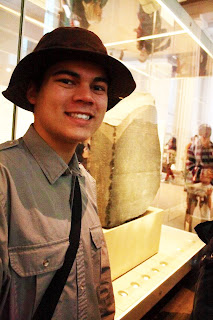I recently got back from spending Christmas in
England! It was a blast and as I was
flying back across the Atlantic, I was struck with inspiration for my post
about emergent order. Now I want to
share the particular moment from the flight where the thought hit me. I was just relaxing and watching The Big Bang
Theory, which is a series that came highly recommended to me from my old
college RA. Then all the sudden, it hit
me (I must have implicitly remembered this video) that I was sitting in a chair
30,000 feet in the air, moving along at 550 miles per hour, and just watching a
TV show (while eating a Twix bar). When
I stopped being awestruck by that fact, I took a minute to unpack everything
that went into crafting this wonderful moment. I do not hesitate to submit to
you that the work of millions of people allowed me to have this
experience. Let me show you how. For the flight, we have the captain and his
co-pilot to thank for the flying itself.
We have the flight attendants to thank for making sure that everything
else was running smoothly (and making sure I got a Twix). We should probably also thank the actors who
make Big Bang Theory so that I could be entertained on that long flight. So that’s a couple dozen people who made a
contribution to my flying-high-and-watching-TV moment. It’s a far cry from millions. But if we stop here, we’ll be missing a lot
of others who made crucial contributions.
In television and in flying, the main players that you see are
accompanied by support staff that you don’t see. There are ground control workers, baggage
workers, air traffic controllers, airline chefs, mechanics and engineers who
make repairs, etc. In television is the
same thing: gaffers, cameramen, directors, prop managers, makeup artists,
editors, producers, promoters, the people who made licensing agreements with
the airline that allowed BBT to be shown on my flight, and others who in
absence, the show would not go on. In
light of that, it makes us want to respect the ground crew or the prop man
more. Though less visible, their impact
would be felt if they were gone.
Perhaps
you are saying, “Well, this is a lot, but surely not millions.” But wait, there’s more! Think of the plane itself. A Boeing 777 is not just two wings attached
to a fuselage. It’s a pretty complex
machine. It had to be designed by
engineers and built by other workers who specialize in making planes. I have one friend who actually presses
airplane turbine engines for a living.
That’s pretty impressive! So
there’s a lot more people who design and assemble the plane. But there’s still more! Airplane parts don’t grow on trees, they have
to be made from raw materials that are made by other companies, who themselves
employ even more workers. Think of the
cameras, computers, microphones, and all other equipment used in the production
of a TV show. They had to be designed
and made by still more people. Think of
the fuel that powered the plane. It got
from the ground to the tank because of the labor of more people. Think of my Twix bar, it was made somewhere
else by some other people. Do you
believe me now when I say that millions of people made my soaring over the
ocean possible?
When
you think of flying like this, you realize it’s a miracle that such a thing
could exist. After all, there was no
central planner that dictated some people work for some company or
another. There was no aviation czar
telling the president we need to have x number more planes this year and
allocate these resources for it. No, the
economy does not have a central planner and yet we see incredible collaboration
by the whole workforce, millions upon millions of individuals. Everyone plays a part to support everyone
else, producing this or that so that everyone else can focus on producing something
else. It is because of this
collaboration that we make each others’ lives better. I got to travel across an ocean in comfort
because of our economy. This is
something that was impossible a thousand years ago and impractical for most
until the rise of commercial aviation in the last century.
This all comes from one moment that I lived in the modern world. Apply this train of thought to anything from
your cup of coffee, to your car, to a university, and you’ll see that our world
that could be chaotic is actually incredibly orderly. All the things great and small work together
to allow us to enjoy the life we do.
That’s why I’m thankful.
Tune
in next time to learn about the force that causes everyone to work together.








